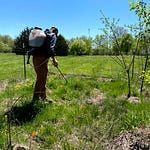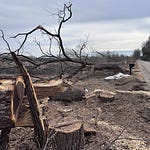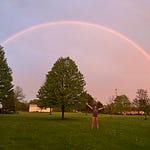This is the newsletter version of Sara by the Season, where I explore what is piquing my curiosity as I try to lean into nature’s wisdom and rhythms. You can listen to me read you the newsletter by hitting play above - or you can click the little link above and to the right to play in your favorite podcast player. If you know someone who would like this sort of thing, I’d be so grateful if you would share it.
In grade school, I asked for a subscription for my birthday to TIME magazine so I could “keep up with the news,” and I felt like reading TIME magazine was the best way to do so. I was a weird kid who was very interested in politics, history, and, if nothing else, appearing well-informed among the adults in my life who I was always trying to impress.
For most of my life, it has been important to me to have some awareness about what is going on in the larger world. I hope I’ve mostly outgrown my need to impress anyone; instead, it feels like a duty as a privileged white person living in America to know what is going on in my own country and around the world. In an anti-racism training at some point, the Black teacher said that “it is a privilege to be able to tune out the news because it doesn’t affect your day-to-day life,” and that convicted me - and not just because it aligned with my existing desire to be informed.
But I began to question this assumption at some point in the last few years. I think my questioning probably started after the 2020 election when I obsessively read about Trump and friends’ efforts to overturn the election. I couldn’t believe that so many elected officials’ efforts to overturn our democracy wasn’t the subject of every dinner or coffee conversation that I was a part of. I wrote about how my body felt physically different after I watched Trump leave the White House in late January 2020: “My shoulders dropped more completely than it feels like they have done since the middle of 2016, even though I’m sure that isn’t true. My body felt the relief almost before my mind had a chance to catch up with me.” I started to realize that my obsession with what was going on wasn’t good for me - physically, mentally, emotionally, spiritually.
But I also didn’t want to be that privileged person who decides to close my eyes to the suffering around me because I can. Shouldn’t I at the bare minimum have to pay attention to what marginalized people or people in war-torn regions or people taking the brunt of the climate catastrophe have to live with day-in and day-out?
In the 1990s, British anthropologist Robin Dunbar proposed an upper limit of the number of people humans can adequately maintain relationships with based on his study of primate brain size and average group size. In what has since come to be known as “Dunbar’s number,” Dunbar contended that humans can only maintain 150 meaningful relationships before the size of the group becomes too cumbersome.
According to Dunbar and many researchers he influenced, this rule of 150 remains true for early hunter-gatherer societies as well as a surprising array of modern groupings: offices, communes, factories, residential campsites, military organisations, 11th Century English villages, even Christmas card lists. Exceed 150, and a network is unlikely to last long or cohere well.
I’m still making my way through The Dawn of Everything, and the authors offer some counterarguments to Dunbar’s number, but regardless of the exact number, it seems fairly obvious that our brains and emotional capacity certainly did not evolve to handle the sheer amount of information about other people that constantly confronts us in just fifteen minutes spent on the internet.
In this year alone, the war in Sudan has killed an estimated 9000 people and displaced 5.6 million people. Casualty estimates from the Russian war in Ukraine are approaching half a million dead on both sides and that doesn’t factor in the thousands of civilian casualties and millions of Ukrainians displaced by the war. Devastating droughts worsened by climate change, the war in Ukraine’s effects on wheat prices, and political unrest have led to crises in Ethiopia and Somalia, displacing 2.7 million people from their homes and leaving 5.1 million children acutely malnourished. More than 35,000 people have been killed in the U.S. from gun violence thus far this year. Pakistan is currently expelling 1.7M Afghan refugees, forcing them back to Afghanistan and to Taliban rule. Al Jazeera is reporting this morning that the death toll in Gaza has surpassed 9000 people and 1400 people in Israel since the Hamas attacks on October 7th.
My point in rattling off all of those disturbing statistics that each reflect real human stories of trauma and tragedy isn’t that what is happening in Gaza or that what happened in Israel on October 7th isn’t worthy of our heartbreak and attention; my point is that we’re always ignoring some atrocity in the world because there are so many concurrently going on. The climate emergency will only make this worse, and I fear the past month has shown us how little capacity we have to relate beyond binaries.
People demanding our energy, voice, and actions on this specific cause while not demanding it about what’s going on in Haiti, for example, feels icky to me. Or for that matter, it feels incongruent to use up my limited time and energy to call my representatives about a complex situation I have little understanding of instead of using that time and energy to better understand what is going on with the surge in drug overdoses in Indiana or the mining conglomerate trying to buy up land around our place and figure out how best to leverage my time and energy to help in these situations that affect my real life neighbors (human and more-than-human)1.
It isn’t usually carelessness that leads to silence; it’s overwhelm and despair. Shaming people into caring about the things you care about isn’t typically very effective - ask me about this because I have a ton of experience being on the giving end of this phenomenon.
Claire L. Evans, writing about one of the mothers of the internet all the way back in 2018, asks,
How did we stop caring about the communities we created? This is partially a question of scale. With mass adoption comes the mass visibility of brutality, and the offshore workers and low-wage contract laborers who moderate the major social media platforms cycle out quickly, traumatized by visions of beheadings and sexual violence. But it’s also a design choice, engineered to make us care about social platforms by concealing from us those who care after them2. Put simply, we have fractured care.
She sums it up: We have fractured care. I’m still prone to want to know what is going on in the world to appear more well-informed and intelligent, just as I was as a young girl. It feels good to be “on the right side of history,” to stand up for the little guy, to feel like we are empathetic and big-hearted people. Social media feeds this desire of ours to be “good” and “right,” and it makes it so easy for us to feel like we’re doing activism when I question whether we’re actually doing anything by reposting memes on Instagram.3 By fracturing our capacity for care, it makes our efforts toward care far less effective, and it leaves us ever-increasingly exposed to the continual exhaustion and disassociation that the outrage cycle breeds. I wrote about the alternative to this fracturing of care that characterizes so much of our culture back in 2021:
I also think we probably, as individuals, need to be more focused on what fires us up. For me, its environmental issues. For my friend whose daughter was in a school shooting, it’s gun control. For some neighbors, it’s discrimination in our schools and community. For a friend at church, it’s the mental health crisis. I care about all of those things too, but I spread my outrage and energy too thin when I try to be an activist about too much. I’d rather go deep on one specific issue then broad on twelve issues - and with that approach, I think there is more opportunity for impact and less likelihood of burnout.
Dunbar says that “150 seems to be the number at which our brains just max out." If Dunbar’s number is anywhere near accurate, this deluge of information about other people that is coming at us each day far exceeds our capacity for holding empathy for those involved, let alone grasping the complexities of the situations in question. I’m not arguing that we shouldn’t care or educate ourselves about the things going on around us, but I am wondering if our capacity for care would be less fractured if we decided what our values are and used those as a barometer of how to show up. Instead of feeling compelled to have an opinion on every catastrophe that arises, perhaps that energy would be better served by connecting more deeply with a smaller number of people and causes that we care about instead of reacting to what the internet tells us to care about.
Scattering Seeds
I’m always finding stuff that supports the thesis of the book I’m writing on the benefits of leaning into nature’s wisdom, as well as other things related to this newsletter’s topic that maybe didn’t fit into the actual newsletter, so I thought I could start sharing those links and things here with all of you in hopes of some of the seeds I share germinating into something beautiful or useful at your place.
As I wrote this week’s newsletter, it kept reminding me of writing I’ve already done on the subject. I’m nothing if not repetitive :) But I think both tired of raging and order-disorder-reorder are worth reading on this topic.
I had another 1000 words started on tying the last month of the news cycle to spiral dynamics, but this was already far too long. Elise Loehnen has the best summary of spiral dynamics I’ve read, and I’m guessing if you read it, you’ll probably figure out where I planned to go.
Fall is grief season, and we celebrate Samhain and All Saint’s Day this week. Here and here is some past grief season reading to help you lean into the invitations of the season.
Here’s to strengthening our capacity for care,
Sara
It feels incongruent to me because one of my values is caring deeply for my place and community. If I was Jewish or Palestinian, it would likely feel incongruent to care about the neighborhood mining operation right now in light of what is going on.
And this was written in 2018 when social media was doing a far better job of attempting to monitor their sites for extremist activity and traumatizing content.
I say this as someone who reposts memes on Instagram!














Share this post